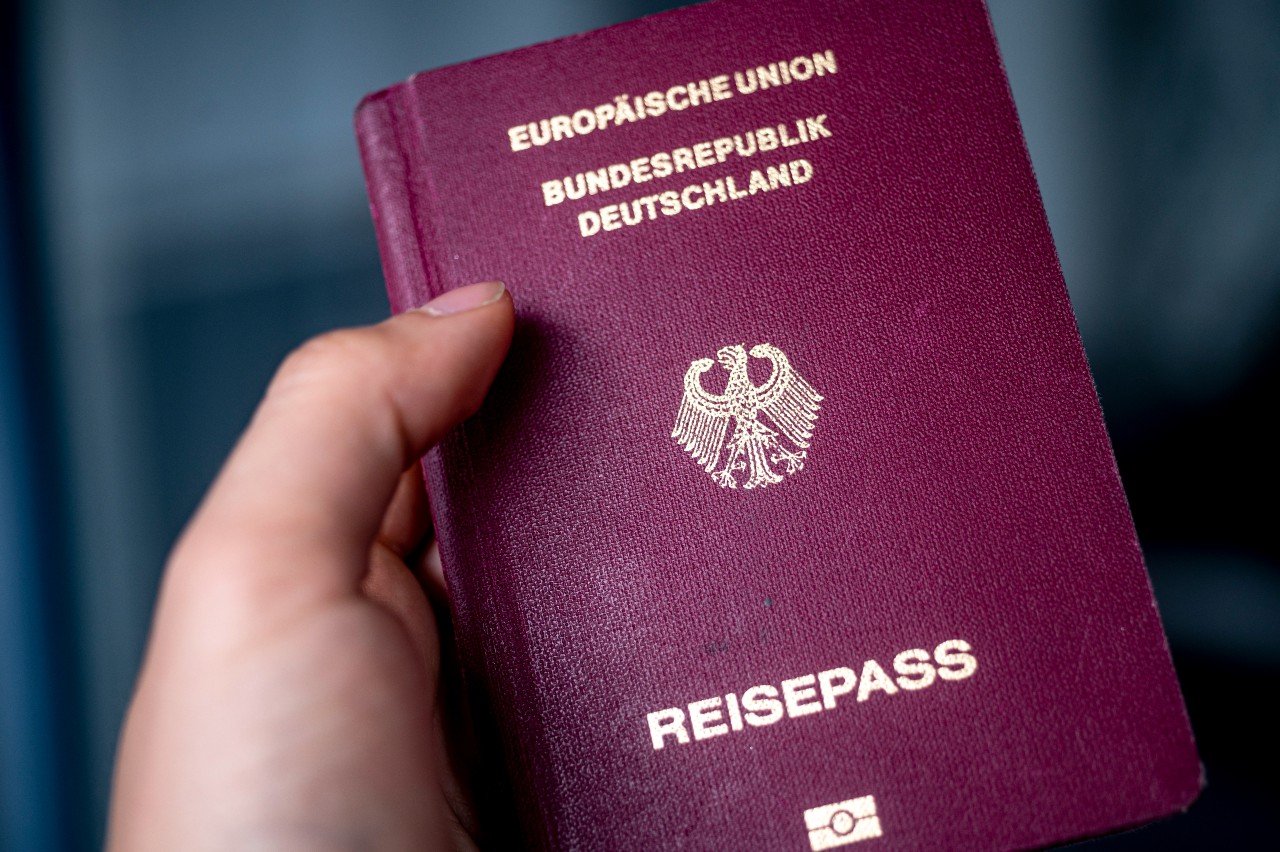INTERVIEW: 'We are determined to pass German citizenship reforms despite delays'

Germany's hotly anticipated dual citizenship law has been put on ice while the government thrashes out concerns about anti-semitism. SPD MP Hakan Demir explains what's going on behind the scenes - and when the law could finally reach parliament.
In the long road towards a modernised citizenship law, Germany's current coalition government has hit a number of obstacles.
Since the plans were first announced back in 2021, the flagship project of the Social Democrats (SPD) has been chewed over and tweaked countless times, factoring in new clauses that don't just ease the rules for foreigners but also tighten them.
One prime example of this was the introduction of strict rules that prevent people who rely on state benefits from naturalising as Germans - a key demand of the pro-business Free Democrats (FDP).
Now, however, the issue on the table is anti-semitism, and it is the same party raising questions about whether the law goes far enough.
On Thursday, November 9th - a date that commemorates the Nazi pogrom that set the Holocaust in motion - the first reading of the citizenship reforms bill was quietly removed from the parliamentary agenda.
The law details plans to permit dual nationality for non-EU foreigners, cut down the residence requirements from eight years to five and toughen up economic requirements - as well as barring people who have racist beliefs at odds with the German constitution.
Explaining the cause for the delay, SPD MP Hakan Demir - a rapporteur working on the bill - said the FDP had forced the reschedule because they "still have questions".
"The question mark that they have right now is if the new citizenship act is good enough to prevent anyone who is anti-semitic from getting German citizenship," Demir told The Local's Germany in Focus podcast on Friday.
LISTEN: Why is Germany's landmark dual citizenship law on hold?
"Right now we have a law that says that no person that is racist, that is anti-semitic and against democracy can be a German citizen - we have this law right now and we will strengthen it. But for the FDP, it's not enough."
When The Local spoke to FDP politician Stephan Thomae, he confirmed that the party wanted to crack down on anti-semitism and that rules could be tightened up even further.
"Anti-semites must not be naturalised, he said. "Anti-semitic statements or actions must therefore lead to exclusion from naturalisation. If it becomes apparent that there is a need for change here, we will address this in further parliamentary proceedings."
READ MORE: Why has Germany’s citizenship reforms been delayed?
Summing up the FDP's goals, he added: "Only those who share our values and our free democratic basic order, as well as those who can live from their own work, will be allowed to naturalise in future."
'Right to exist'
According to Demir, one FDP demand is that foreigners explicitly acknowledge Israel's right to exist as part of the naturalisation process - an idea similar to one recently raised by Friedrich Merz, the leader of the opposition Christian Democratic Union (CDU) party.
"We have to figure out in what way that can enter the new citizenship act, and if it's a good point to do so," Demir said.
That's partly because the law already takes a clear line on the exclusion of people with racist or anti-democratic views - and insists that foreigners respect the existence of all states, including Israel.
Crucially though, Israel is not mentioned explicitly.

Hakan Demir, an MdB for Berlin-Neukölln, serves as SPD rapporteur on the new German draft law to allow dual citizenship. Photo: Photothek
Announcing the government's planned citizenship reforms in a press conference this summer, Interior Minister Nancy Faeser (SPD) emphasised that Germany would take a "zero-tolerance" approach to xenophobia.
In future, any racist, inhumane or anti-semitic acts would effectively bar foreigners from citizenship, she said.
But in the aftermath of the October 7th terrorist attacks in Israel, fears of "imported" anti-semitism in migrant communities have been violently reawakened and have put largely Muslim groups - including Germany's expansive Turkish community - firmly in the firing line.
READ ALSO: Could your political views bar you from becoming a German citizen?
Heated debates about integration have been held with a renewed vigour, while the CDU has demanded that the citizenship reforms be scrapped in the wake of recent pro-Palestine demos.
But Demir sees much of this outcry - and particularly the backlash against dual nationality - as right-wing opportunism.
"The CDU and CSU don't need any focussing events like protests on the streets of Neukölln or Berlin to be against this law," he said. "They have been against it for 20, 30 years, but now they are using new arguments."
Many of these arguments rely on generalisations about people with a migration background, the SPD politician added.
"It's terribly wrong to say that the people who are demonstrating - some of them against Israel - are Germans with Muslim background, and we don't want further people to become German, because they are anti-semites and so on," he said. "That's the stereotype that that the CDU has."
'Under pressure'
For the some 10 million foreigners waiting for Germany's citizenship reforms to pass, the news of a further delay has been another major blow.
But the SPD remains determined to forge ahead with its plans, with Chancellor Olaf Scholz even intervening to try and move the process along.
"It's a big issue for us that we go forward with with this act - and lots of people are expecting us to to pass this law, they are waiting for 20 years, so we are under pressure," said Demir. "And we will give this pressure also to the FDP because we are also waiting for the bill to be in the parliamentary process for one year, more or less."
READ ALSO: What’s next for Germany’s landmark citizenship reform?
Changing one or two minor points in the legislation shouldn't be too difficult to do and should mean that the bill can move forward in the coming weeks. "I hope that we will have the first reading this year," he said. "It's still too late, actually. But I hope so."

A German passport. Photo: picture alliance/dpa | Fabian Sommer
FDP politician Thomae also seemed confident that the law would go to the Bundestag soon.
"The citizenship law is expected to be presented to the Bundestag for its first reading in a fortnight's time - so the week beginning November 27th," he explained. That would make it likely for a first reading to take place on November 30th or December 1st.
Despite the rightwards lurch in Germany's politics in recent weeks, Demir said it was important not to lose sight of the aims of improving German democracy and the rights of foreigners in the country.
"We have 10 million people in Germany with a migration background. And they are working here they are living here, their children going to schools or studying. They have a big value here in Germany, and we have to see that as well," he said.
The draft of the law is now "ready to be passed" when it finally makes it into the Bundestag.
"We are ready to do it," Demir said. "And I think (the) FDP knows that as well."
Comments (2)
See Also
In the long road towards a modernised citizenship law, Germany's current coalition government has hit a number of obstacles.
Since the plans were first announced back in 2021, the flagship project of the Social Democrats (SPD) has been chewed over and tweaked countless times, factoring in new clauses that don't just ease the rules for foreigners but also tighten them.
One prime example of this was the introduction of strict rules that prevent people who rely on state benefits from naturalising as Germans - a key demand of the pro-business Free Democrats (FDP).
Now, however, the issue on the table is anti-semitism, and it is the same party raising questions about whether the law goes far enough.
On Thursday, November 9th - a date that commemorates the Nazi pogrom that set the Holocaust in motion - the first reading of the citizenship reforms bill was quietly removed from the parliamentary agenda.
The law details plans to permit dual nationality for non-EU foreigners, cut down the residence requirements from eight years to five and toughen up economic requirements - as well as barring people who have racist beliefs at odds with the German constitution.
Explaining the cause for the delay, SPD MP Hakan Demir - a rapporteur working on the bill - said the FDP had forced the reschedule because they "still have questions".
"The question mark that they have right now is if the new citizenship act is good enough to prevent anyone who is anti-semitic from getting German citizenship," Demir told The Local's Germany in Focus podcast on Friday.
LISTEN: Why is Germany's landmark dual citizenship law on hold?
"Right now we have a law that says that no person that is racist, that is anti-semitic and against democracy can be a German citizen - we have this law right now and we will strengthen it. But for the FDP, it's not enough."
When The Local spoke to FDP politician Stephan Thomae, he confirmed that the party wanted to crack down on anti-semitism and that rules could be tightened up even further.
"Anti-semites must not be naturalised, he said. "Anti-semitic statements or actions must therefore lead to exclusion from naturalisation. If it becomes apparent that there is a need for change here, we will address this in further parliamentary proceedings."
READ MORE: Why has Germany’s citizenship reforms been delayed?
Summing up the FDP's goals, he added: "Only those who share our values and our free democratic basic order, as well as those who can live from their own work, will be allowed to naturalise in future."
'Right to exist'
According to Demir, one FDP demand is that foreigners explicitly acknowledge Israel's right to exist as part of the naturalisation process - an idea similar to one recently raised by Friedrich Merz, the leader of the opposition Christian Democratic Union (CDU) party.
"We have to figure out in what way that can enter the new citizenship act, and if it's a good point to do so," Demir said.
That's partly because the law already takes a clear line on the exclusion of people with racist or anti-democratic views - and insists that foreigners respect the existence of all states, including Israel.
Crucially though, Israel is not mentioned explicitly.

Announcing the government's planned citizenship reforms in a press conference this summer, Interior Minister Nancy Faeser (SPD) emphasised that Germany would take a "zero-tolerance" approach to xenophobia.
In future, any racist, inhumane or anti-semitic acts would effectively bar foreigners from citizenship, she said.
But in the aftermath of the October 7th terrorist attacks in Israel, fears of "imported" anti-semitism in migrant communities have been violently reawakened and have put largely Muslim groups - including Germany's expansive Turkish community - firmly in the firing line.
READ ALSO: Could your political views bar you from becoming a German citizen?
Heated debates about integration have been held with a renewed vigour, while the CDU has demanded that the citizenship reforms be scrapped in the wake of recent pro-Palestine demos.
But Demir sees much of this outcry - and particularly the backlash against dual nationality - as right-wing opportunism.
"The CDU and CSU don't need any focussing events like protests on the streets of Neukölln or Berlin to be against this law," he said. "They have been against it for 20, 30 years, but now they are using new arguments."
Many of these arguments rely on generalisations about people with a migration background, the SPD politician added.
"It's terribly wrong to say that the people who are demonstrating - some of them against Israel - are Germans with Muslim background, and we don't want further people to become German, because they are anti-semites and so on," he said. "That's the stereotype that that the CDU has."
'Under pressure'
For the some 10 million foreigners waiting for Germany's citizenship reforms to pass, the news of a further delay has been another major blow.
But the SPD remains determined to forge ahead with its plans, with Chancellor Olaf Scholz even intervening to try and move the process along.
"It's a big issue for us that we go forward with with this act - and lots of people are expecting us to to pass this law, they are waiting for 20 years, so we are under pressure," said Demir. "And we will give this pressure also to the FDP because we are also waiting for the bill to be in the parliamentary process for one year, more or less."
READ ALSO: What’s next for Germany’s landmark citizenship reform?
Changing one or two minor points in the legislation shouldn't be too difficult to do and should mean that the bill can move forward in the coming weeks. "I hope that we will have the first reading this year," he said. "It's still too late, actually. But I hope so."

FDP politician Thomae also seemed confident that the law would go to the Bundestag soon.
"The citizenship law is expected to be presented to the Bundestag for its first reading in a fortnight's time - so the week beginning November 27th," he explained. That would make it likely for a first reading to take place on November 30th or December 1st.
Despite the rightwards lurch in Germany's politics in recent weeks, Demir said it was important not to lose sight of the aims of improving German democracy and the rights of foreigners in the country.
"We have 10 million people in Germany with a migration background. And they are working here they are living here, their children going to schools or studying. They have a big value here in Germany, and we have to see that as well," he said.
The draft of the law is now "ready to be passed" when it finally makes it into the Bundestag.
"We are ready to do it," Demir said. "And I think (the) FDP knows that as well."
Join the conversation in our comments section below. Share your own views and experience and if you have a question or suggestion for our journalists then email us at [email protected].
Please keep comments civil, constructive and on topic – and make sure to read our terms of use before getting involved.
Please log in here to leave a comment.